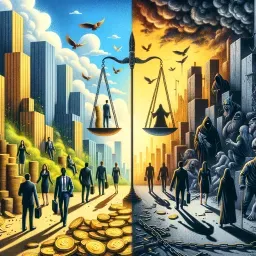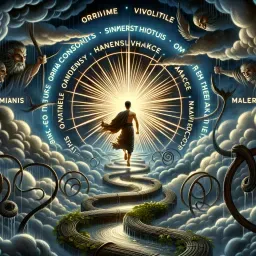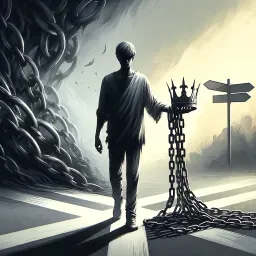”I spent my whole life trying not to be careless.
Women and children can afford to be careless, but not men“

- Meaning
- This phrase embodies the philosophical tensions surrounding gender roles and responsibilities in society. It suggests that men must constantly be vigilant and responsible, bearing the weight of expectations that can lead to psychological strain. Historically, this aligns with gender norms that have assigned different roles and behaviors to men and women, precipitating discussion on masculinity and societal expectations. It highlights the burdensome idea that carelessness is a privilege afforded to the vulnerable, while men must exhibit control and awareness at all times.
- Allegory
- In this allegorical image, the man represents the struggle between embracing carelessness and the expectation of responsibility. The crossroads illustrate the tension between personal desires for freedom and the societal duty imposed on masculinity. The contrasting environments evoke the emotional weight of these expectations, while the symbols serve to remind viewers of the inherent responsibilities that come with manhood, echoing the phrase's core message.
- Applicability
- In personal life, this phrase can serve as a catalyst for self-reflection on one’s responsibilities and the pressures that come with societal expectations. By acknowledging these norms, individuals might work towards a balance between responsibility and care, advocating for a more egalitarian view that allows everyone, regardless of gender, to embrace both care and freedom responsibly.
- Impact
- The phrase has had a considerable impact on cultural discussions surrounding masculinity, responsibility, and societal norms. Hemingway's works have inspired movements focused on redefining masculinity, and it is often quoted in discussions about gender roles and responsibilities in contemporary society.
- Historical Context
- This phrase likely emerged in the early to mid-20th century, aligning with the publication of Hemingway's works that often dealt with themes of masculinity and social-class expectations. Hemingway wrote extensively between the 1920s and the 1950s, during a time when views on gender roles were rigid and distinctly defined.
- Criticisms
- Critics may argue that this phrase perpetuates harmful stereotypes by suggesting that men must be overly responsible while undermining the validity of carelessness as a virtue in others. Arguments against this could involve advocating for shifts in traditional gender norms to encourage emotional vulnerability and shared responsibilities regardless of gender.
- Variations
- Variations of this phrase exist in many cultures, often focusing on the concept of duty and the expectations of leadership or responsibility within families. For instance, in some Eastern philosophies, the Confucian ideal emphasizes filial piety and responsibility, creating similar dynamics but within different cultural frameworks.
-

Say 'what' again. I dare you, I double dare you!
-

I don't like violence, Tom. I'm a businessman. Blood is a big expense.
-

If my answers frighten you, then you should cease asking scary questions.
-

In Sicily, women are more dangerous than shotguns.
-

The path of the righteous man is beset on all sides by the inequities of the selfish and the tyranny of evil men.
-

Just when I thought I was out, they pull me back in.
-

I’m a damsel, I’m in distress, I can handle this.
-

What’s the matter with you? Is this how you turned out? A Hollywood finocchio that cries like a woman?
-

I'm sorry, did I break your concentration?
-

Power wears out those who do not have it.
-

Life is like riding a bicycle. To keep your balance, you must keep moving.
-

Life is the sum of all your choices.
No Comments